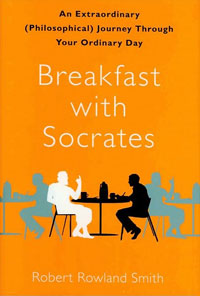Hors d'Oeuvres With Wittgenstein

Having succumbed to the old-fashioned precept that a liberal education was useful for more than vocational guidance and career enhancement, I chose to study philosophy as an undergraduate, more specifically various tributaries of logical positivism that flowed from that Amazon river of 20th-century philosophy, the Vienna Circle.
Of course one was required to be familiar with the touchstones of Western Philosophy, from the early Greeks to Medieval Christians to the (European) Rationalist and (British) Empiricists to the 19th-century downers, Nietzsche, Schopenhauer, Kierkegaard, and so forth. So it is with some ambivalence that I view the occasional publication of mainstream books purporting illumination of some area of philosophy (as opposed to a almost totally useless self-help book offering a new life-altering philosophy)—Dreaming with Descartes; The Consolations of Philosophy; What Would Ludwig Say?; The Phenomenology of Reality TV; and Artie, Freddie, and Soren, and the Five Paths to Success in Real Estate.
My biggest concern or unresolved issue is my inability to negotiate the slim terrain that such literature occupies on the frontier between popularization and trivialization. So much of what is claimed to be philosophy in the popular argot is simply just the use of that word as a synonym for “thinking” or “thought,” as in “my philosophy of washing the hardwood floors is…”
Now comes British philosopher and management consultant Robert Rowland Smith’s Breakfast with Socrates: An Extraordinary (Philosophical) Journey Through Your Ordinary Day (Free Press), intending to prove philosophy useful in everyday life and how the day-to-day can render philosophy accessible. Judge for yourself if Smith’s approach warrants your consideration: The first four chapters are organized as “Waking up,” “Getting ready,” “Traveling to work,” “Being at work.” And the chapters that follow are “Going to the doctor,” “Having lunch with your parents,” “Bunking off,” and “Shopping.”
Maybe that organizational scheme makes sense to you. Or the name dropping of the bold faced names from the history of philosophy gives you pause to ruminate on your life.
Not to me.
